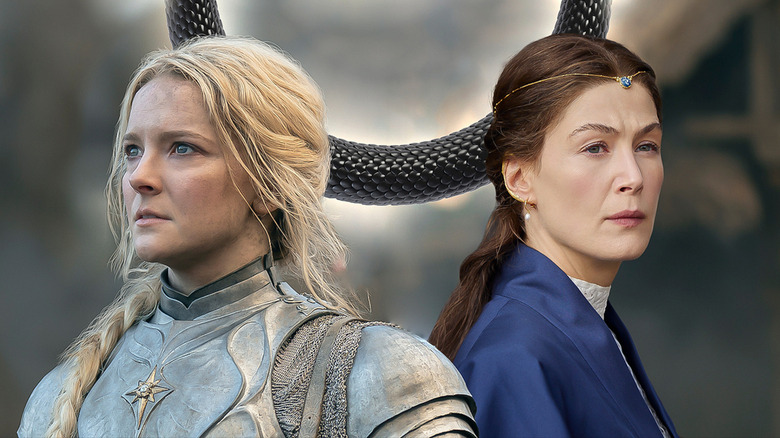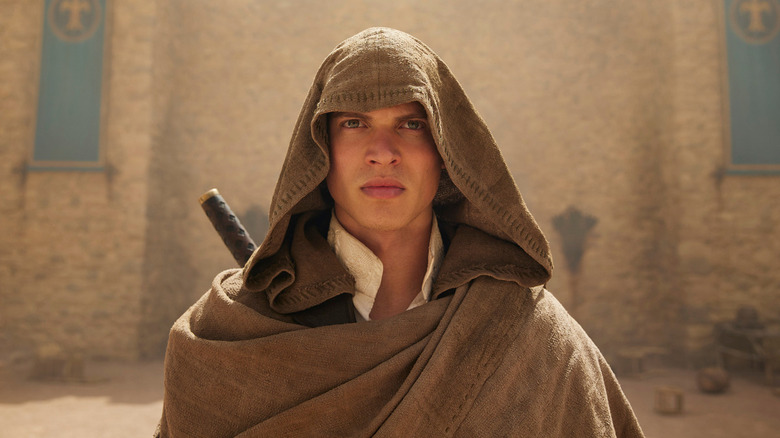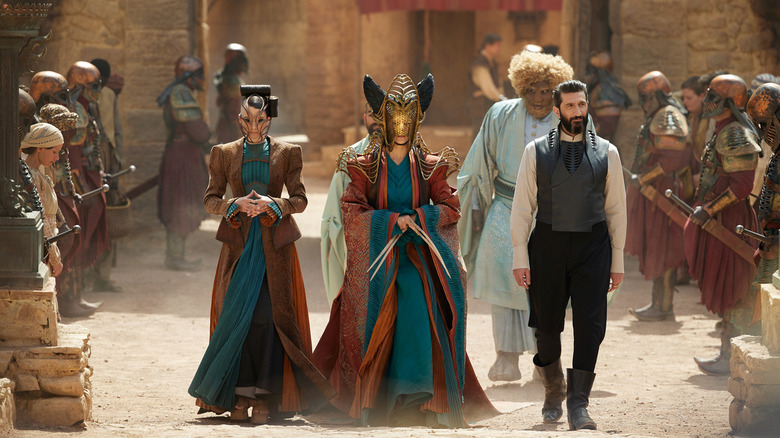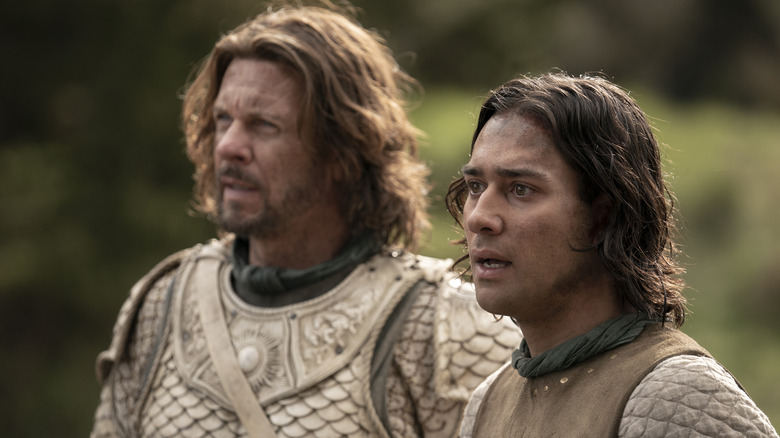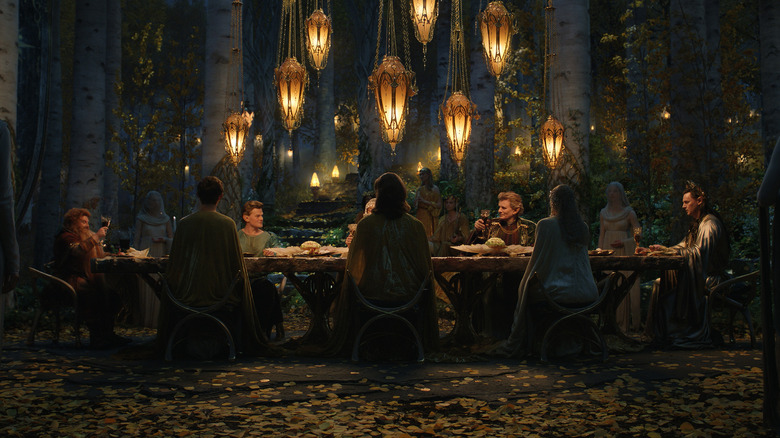Wheel Of Time Proved How The Rings Of Power Can Redeem Itself In Season 2
Amazon Studios has been pouring resources into acquiring major IPs that it can build into multi-season epics for its streaming service. This is nothing new in the modern entertainment industry. HBO has "Game of Thrones." Apple TV+ has "Foundation." Netflix still claims to have a "Chronicles of Narnia" reboot in the works. In the case of Jeff Bezos' entertainment enterprise, two of the biggest flagship shows are "The Wheel of Time" and "The Lord of the Rings: The Rings of Power." Both shows are still in their infancy. Season 1 of the Robert Jordan adaptation came out in 2021, and the correlating installment of the Second Age Tolkien show arrived a year later. Both projects got off to a rocky start, too, with the initial seasons of "Wheel" and "Rings" receiving abysmal Rotten Tomatoes audience scores of 60% and 38%, respectively.
Here's the thing, though. In the summer of 2023, Season 2 of "The Wheel of Time" finally arrived, and guess what? It got better. Way better. How much better? The Season 2 Rotten Tomatoes audience score jumped 22 percentage points from Season 1, landing at a solid and respectable 82%. Translation: It's great now.
Season 2 of "The Rings of Power" should arrive at some point in the not-too-distant future (assuming the Hollywood strikes haven't had any hitherto unknown effects on the production). The question is, can Amazon's flagship Middle-earth series learn from the upward momentum of "Wheel of Time" and do the same? Let's consider some of the factors that drove the successful second installment of Robert Jordan's on-screen universe. From there, we'll take a look at how "Rings of Power" could learn from those lessons to redeem its tepid initial reception as it moves its massive Second Age story forward.
The Wheel of Time is good now, folks, and Rings of Power can take notes
"The Wheel of Time" is good now. It's a statistical fact. Season 1 was rough, and Season 2 responded by upping the ante in a major way. So, what happened in between the two seasons that caused this dramatic improvement? We have some ideas. Let's start with Season 1.
Season 1 of "Wheel of Time" roughly followed Book One of the massive 14-book series. Even with that limited scope, showrunner Rafe Judkins and his team at Jordan Studios had to boil hundreds of pages of source material down into a manageable eight-episode story. Despite the contraction, Season 1 still started off slow. It had to introduce numerous locations, nations, and cultures, which are a dime a dozen in Jordan's world. Concepts like the One Power had to be explained. Races like Trollocs and Ogier were new to many viewers. And then there were the characters. Jordan wrote thousands of characters into his world, hundreds of whom are consistently in the spotlight. Narrowing that list down and then introducing everyone in their turn was a massive job, and it dragged the season down.
Shortly before Season 2 aired, David Goyer, showrunner for Apple TV+'s "Foundation" series, spoke to The Verge about the overwhelming challenge of establishing these massive fictional universes on-screen. Goyer pointed out that many of the worthwhile shows take a while to get going. "The Wheel of Time" clearly struggled with this weighty setup process in its earlier episodes. Add in the fact that fans will always be taken aback by certain adaptive choices when you turn a book into a serialized script, and Season 1 was fighting an uphill battle from day one.
So why did Season 2 of The Wheel of Time get better?
Understanding why Season 1 of "Wheel of Time" struggled is one thing. Sorting out how Season 2 got so much better is another. Looper visited Jordan Studios in Prague just before Season 2 came out, and during these investigations, found that Season 2 was different.
For one thing, it moved much faster. When Looper asked producer Marigo Kehoe about pacing for Season 2, especially with a multi-month time jump involved to start the season, she said, "It's got its own momentum. It does speed up. It is big," adding that the speed and the character-driven journeys are doing their own thing and each contributing to the overall momentum. The fact that Season 2 draws from not one but two books, as well, led to a much faster feel for the story. The stakes were already set during Season 1, and the main characters were already in place when Season 2 began. This allowed Judkins and company to dive right into the action. It also enabled them to introduce new things at a more reasonable speed. For instance, the entire Seanchan threat in Season 2 doesn't feel as rushed as, say, introducing the entire culture of the northern border kingdom of the Shienar in the final episodes of Season 1.
In addition, the show had already answered the question of the identity of the Dragon Reborn (spoiler, folks — it was Rand all along!). This avoided the need for more season-long mystery boxes. The introduction of the Forsaken was also huge, as it provided more relatable villains with greater depth and individuality. Put all of this together, and Season 2 becomes a pretty gosh, darn good chunk of television.
Rings of Power should be watching Wheel of Time's newfound success closely
As a fellow Amazon Studios project, "The Rings of Power" has had a similar arc so far. Season 1 was definitively received by viewers as a mediocre entertainment experience. Sure, people watched. That was to be expected with such a massive tentpole production. However, there were a lot of things to criticize as the season unfolded.
The pacing, for instance, was jarring at times. The interactive map shots were helpful, but the story hopped around Middle-earth far too quickly, leaving all but the most diehard Tolkien fans in a state of confusion. The slow, sprawling pace was also hampered by a menagerie of Elven, Dwarven, Human, Harfoot, Wizarding, and Orcish characters, all of whom had to be introduced and developed far too quickly.
To be clear, this doesn't mean the show was terrible. On the contrary, the harshest critics really should give "Rings of Power" a second chance and judge it on its own merits. But just because it isn't awful doesn't mean it's great. On the contrary, the show's various Season 1 struggles held it back from being truly exceptional — for now. That's where Season 2 has an opportunity to be a game-changer.
Season 2 of Rings can build fast on Season 1's foundation
In much the same way as "The Wheel of Time," "The Rings of Power" has an opportunity to redeem itself in the eyes of its audience heading into Season 2. This has to start with pacing. Season 2 must hit the ground running. It needs to resist spending more time establishing storylines or introducing more central characters. Instead, it needs to dive headlong into the fallout of the dramatic Sauron reveal at the end of Season 1.
The good news is that it already appears that this may be the case. Rumors already claim we should get plenty of fighting between the Elves and Sauron before the end of the season, and if that's true, we'll likely get the rest of the forging of the Rings of Power before that occurs, too.
While everything is set for a faster story, though, that doesn't mean it's inevitable. On the contrary, the studio has already announced dozens of new faces for Season 2. That's fine if it's needed to build out the story. But showrunners JD Payne and Patrick McKay must resist the temptation to spend tons of time introducing and developing the characters that these actors will portray. They need to find ways to seamlessly weave them into the narrative without bogging things down.
Rings of Power must follow Wheel of Time's blueprint and not get into the weeds with Season 2
It's also important that Season 2 resist the mystery box narrative. The whole "Who's Sauron?" angle for Season 1 went on for far too long — the entire season, to be precise. Yes, Sauron can shapeshift, and he's famous during this part of Tolkien's writings for his deceptive appearances. But you can tell that fact in a story without trying to pull the wool over the audience's eyes the entire time.
Season 1 also spent far too much time developing unnecessary storylines. Creating the whole "mithril is supercharged by a silmaril, and the Elves need to bathe in its light, or they'll perish" story was completely unnecessary. It might have been an attempt to add more motivation behind the Elves' collective activity. But along with being hard to believe, it added even more complexity to an already overcrowded narrative.
Instead, "The Rings of Power" should stay focused and on track with Tolkien's larger Second Age story. The show has already set the stage and introduced its core characters. Now it's time to get the story moving toward its inevitable conclusion on the slopes of Mount Doom four long seasons from now. The best way they can do that is by using the necessary (albeit at times slow and painful) Season 1 setup to supercharge the story moving into Season 2. As Gandalf says in "The Return of the King," "The board is set, the pieces are moving."
It's time to play the game, guys. Hey, it worked for "The Wheel of Time." Why shouldn't it be the recipe for success for "Rings of Power," too?
